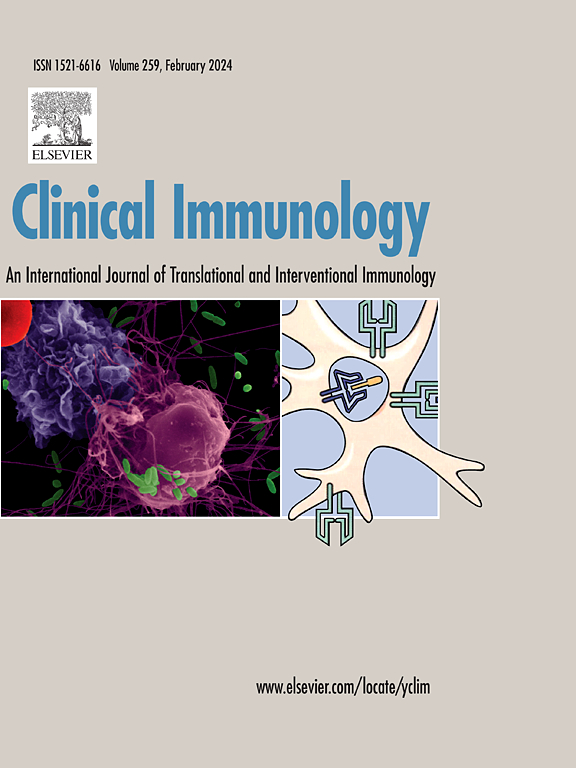类风湿关节炎患者弥漫性大B细胞淋巴瘤与包括CXCL13在内的B细胞驱动因子升高有关。
IF 3.8
3区 医学
Q2 IMMUNOLOGY
引用次数: 0
摘要
与一般人群相比,类风湿关节炎(RA)患者患弥漫性大B细胞淋巴瘤(DLBCL)的风险增加。在这里,我们探讨了发展为DLBCL的RA患者血液中的炎症谱。RA- dlbcl患者的促炎标志物TNF、IL-8、CXCL9、APRIL,尤其是CXCL13的水平显著高于RA对照组(中位数为796 vs 206 pg/mL, p = 0.001)。通过包括类风湿因子、抗ccp2 IgG、抗瓜氨酸化蛋白抗体(ACPA)精细特异性和其他抗修饰蛋白抗体的广泛自身抗体组,所有RA-DLBCL患者的自身抗体均为血清阳性。然而,与RA对照组相比,RA- dlbcl患者没有表现出明显不同的自身抗体特征。RA- dlbcl患者和RA对照组的免疫球蛋白游离轻链和c反应蛋白水平相似。总之,RA-DLBCL患者表现出促炎特征,其标志物升高对B细胞很重要,可能有助于增强B细胞活化并促进淋巴瘤发展。本文章由计算机程序翻译,如有差异,请以英文原文为准。
Diffuse large B cell lymphoma in rheumatoid arthritis patients is associated with elevated B-cell driving factors including CXCL13
Patients with rheumatoid arthritis (RA) are at increased risk of diffuse large B cell lymphoma (DLBCL) compared to the general population. Here, we explored the inflammatory profiles in the blood of RA patients who had developed DLBCL. RA-DLBCL patients had significantly higher levels of the pro-inflammatory markers TNF, IL-8, CXCL9, APRIL, and particularly CXCL13 (median 796 vs. 206 pg/mL, p = 0.001), compared to RA controls. By including an extensive autoantibody panel of rheumatoid factor, IgG anti-CCP2, anti-citrullinated protein antibodies (ACPA) fine-specificities, and other anti-modified protein antibodies, all RA-DLBCL patients were autoantibody seropositive. Yet, RA-DLBCL patients did not display significantly different autoantibody signatures compared to RA controls. The levels of immunoglobulin free light chains and C-reactive protein were similar in RA-DLBCL patients and RA controls. In conclusion, RA-DLBCL patients exhibit pro-inflammatory signatures with elevated markers that are important for B cells and may contribute to enhanced B-cell activation and promote lymphoma development.
求助全文
通过发布文献求助,成功后即可免费获取论文全文。
去求助
来源期刊

Clinical immunology
医学-免疫学
CiteScore
12.30
自引率
1.20%
发文量
212
审稿时长
34 days
期刊介绍:
Clinical Immunology publishes original research delving into the molecular and cellular foundations of immunological diseases. Additionally, the journal includes reviews covering timely subjects in basic immunology, along with case reports and letters to the editor.
 求助内容:
求助内容: 应助结果提醒方式:
应助结果提醒方式:


